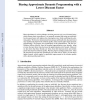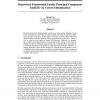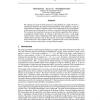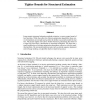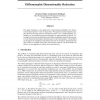107
click to vote
NIPS
2008
15 years 2 months ago
2008
Most algorithms for solving Markov decision processes rely on a discount factor, which ensures their convergence. It is generally assumed that using an artificially low discount f...
121
Voted
NIPS
2008
15 years 2 months ago
2008
In this paper we consider approximate policy-iteration-based reinforcement learning algorithms. In order to implement a flexible function approximation scheme we propose the use o...
NIPS
2008
15 years 2 months ago
2008
We study the profit-maximization problem of a monopolistic market-maker who sets two-sided prices in an asset market. The sequential decision problem is hard to solve because the ...
129
Voted
NIPS
2008
15 years 2 months ago
2008
Recently, supervised dimensionality reduction has been gaining attention, owing to the realization that data labels are often available and indicate important underlying structure...
93
Voted
NIPS
2008
15 years 2 months ago
2008
We continue our study of online prediction of the labelling of a graph. We show a fundamental limitation of Laplacian-based algorithms: if the graph has a large diameter then the ...
100
Voted
NIPS
2008
15 years 2 months ago
2008
Large-margin structured estimation methods minimize a convex upper bound of loss functions. While they allow for efficient optimization algorithms, these convex formulations are n...
97
Voted
NIPS
2008
15 years 2 months ago
2008
Randomized neural networks are immortalized in this well-known AI Koan: In the days when Sussman was a novice, Minsky once came to him as he sat hacking at the PDP-6. "What a...
69
Voted
NIPS
2008
15 years 2 months ago
2008
116
Voted
NIPS
2008
15 years 2 months ago
2008
Uncertainty is omnipresent when we perceive or interact with our environment, and the Bayesian framework provides computational methods for dealing with it. Mathematical models fo...
103
Voted
NIPS
2008
15 years 2 months ago
2008
This paper introduces a new approach to constructing meaningful lower dimensional representations of sets of data points. We argue that constraining the mapping between the high a...
